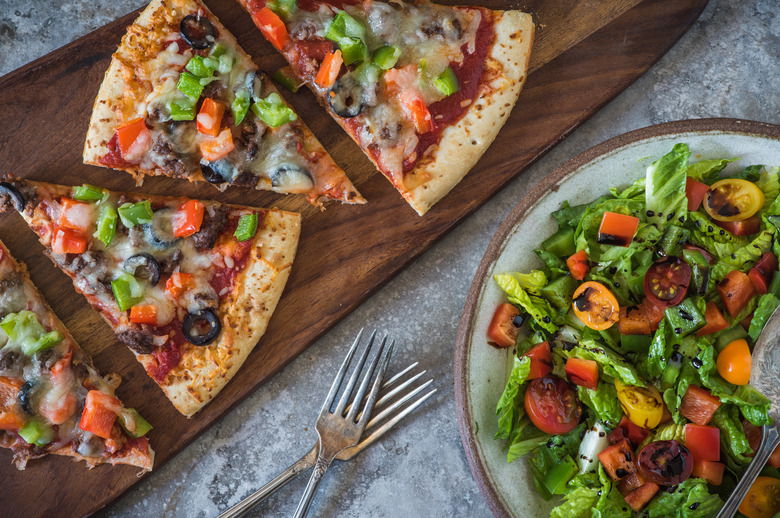The Healthiest New Year's Resolution For 2018, According To Science
Brace yourselves — it's January. Online, that means you're about to hear a vicious barrage of health recommendations and diet tips. They're going to start popping up on your newsfeed, landing in your email inboxes, and littering all kinds of homepages. Journalists with zero health knowledge or schooling are going to guilt you into quitting dessert. Magazine advertisements are going to bribe you into buying in to whatever weight loss scheme sponsors their brand.
But most of these recommendations are going to be totally misguided. Track the evidence back to the source and, nine times out of ten, you'll find that there is none. There's only one thing that works to provide lasting health and happiness, so far as science is concerned: intuitive eating. And intuitive eating involves throwing away all that diet-friendly gab in favor of the messages your body sends you every single day.
You might think, But what about all those studies proving that certain foods fight fat and keep you full? What about my metabolism? If I could just hack that...
Unfortunately, the science shows you can't. Those studies looking at impacts of individual foods, calorie burn, metabolism, etc. all neglect to assess what implementing the advice they give looks like long term. Sure, you might see short-term results. You might shave off a few pounds by cutting out sugar for all of January and feel really great about yourself. But fast-forward a year or two and the odds are not in your favor. You're statistically destined to gain the weight back and feel worse.
But with intuitive eating, the science has spoken: That doesn't happen. After a year, intuitive eaters still feel (and are) healthier.
Allow me to explain. One study published in the Journal of the American Dietetic Association followed almost 80 women, all white, obese, and chronic dieters, through two different types of health interventions. One group started a modest diet — slight calorie reduction, instruction on the nutrition of foods, etc. — while another learned about intuitive eating and size acceptance. Size acceptance involves looking at your health from a weight-neutral perspective (i.e., being healthy for the sake of your health, not to lose weight).
Forty-one percent of the dieters' commitment started to wane over time, resulting in many quitting the diet and failing to deliver weight loss. Only 8 percent of the intuitive eaters felt motivated to quit. While the dieters did exhibit weight loss in the short-term, a long-term follow-up revealed that the weight was largely regained — with a few extra pounds tacked on. The intuitive eaters found weight stability over time.
Other variables that were measured included metabolic fitness, blood pressure, energy expenditure through movement, self-esteem, body image, and more. The intuitive eaters showed improvement on all measured aspects of health across the board. Lower risk of disease. More movement and exercise. Better body image and mental health stability. The dieters? Not so much.
By intuitively eating, you're actually working to reduce your risk of heart disease, diabetes, hypertension, and so much more. By intuitively eating, you're setting yourself up for feeling great about your body regardless of weight loss — weight loss that isn't at all probable, statistically, in the long-term.
By dieting, you're setting yourself up for body dissatisfaction, shame, short-term weight loss, and long-term weight gain.
That's not the only study that says it, either. There are dozens linking intuitive eating to confidence, body appreciation, and weight stability. By trying to lose weight, aren't you really just trying to feel better about your body?
So this January, let's quit the resolutions to diet and resolve instead to eat intuitively.
Sounds vague, I know. That's because it is. It's extremely vague, involves zero rules or guidelines, and you'll never really be sure if you're doing it right.
But that's okay. Resolutions are meant to be long-term, and intuitive eating is something you'll be working on for awhile.
Try looking at food completely neutrally — deciding between a cupcake and a bushel of kale, for instance — without thinking of one as being better than the other. Try making decisions completely from the signals your body is telling you, without any nutrition knowledge or weight goal. Maybe your body needs simple sugars and butter. Maybe it needs fiber and vitamin K.
To decide intuitively, you have to completely re-train your brain without relying on diet rules. Doing that every day is way harder than just deciding to do the Whole30.
Before trusting that yoga-loving health blogger on the next cleanse or detox they're begging you to try, look at the science of what they're recommending. Is there any? Or are they relying on one of the many food and exercise myths that, these days, we've all misguidedly started to believe?
